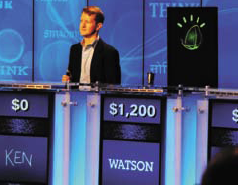IBM's Watson computer system competes against Jeopardy! champion Ken Jennings. Credit: IBM
Watson, IBM’s celebrity supercomputer, has already trounced the two best human Jeopardy! players. But does the computer, which uses natural language processing to interpret complex, nuanced questions and provide accurate answers in English, have a bedside manner?
Herbert Chase, professor of clinical medicine in the Department of Biomedical Informatics, has been working with IBM to retrofit the computer to help doctors diagnose and treat patients. “It’s been impossible for probably 20 or 30 years for a human to process the information required to practice medicine at the highest, evidence-based, guideline-based level,” Chase says.
If the experiment works, Watson could give physicians immediate, accurate answers to unusual, head-scratching questions that come up in their daily practice and do so based not only on the latest published research, but also the blogosphere.
For example, while the general practitioner has a great breadth of knowledge, he or she may lack in-depth information about specific diseases or conditions. Similarly, a specialist may have that depth of knowledge but lack the breadth. “Watson has both, breadth and depth,” he says. “It can look up anything, in terms of breadth—bone disease, OBGYN, dermatology. But it also has incredible depth. And it can bring to the primary care physician the depth that he or she would not otherwise have access to.”
Over the last year, Chase and two of his students at the College of Physicians and Surgeons have been performing a series of tests on Watson that involve asking the computer questions and sorting through its answers.
“Watson has done incredibly well,” Chase says. “You say ‘fever, weight loss, joint pain, skin rash’ and Watson comes up with three or four suggestions [of a diagnosis] which are incredibly accurate.” When Watson is off the mark, Chase and his students try to figure out why, and then they report their findings to the programmers at IBM.
Unlike Alex Trebek on Jeopardy!, Chase and his students don’t want the one best answer, they want several. “We want the top five candidates of the possible illness. We don’t care what is No. 1 and No. 2 and No. 3, because although in medicine we certainly pay attention to the likelihood of something, we have to keep in mind the least likely possibilities as well.”
Chase believes Watson’s greatest potential is in the area of personalized medicine. Since two patients with the same diagnosis won’t respond identically to the same treatment, every patient’s care needs to be, in effect, custom-designed. With its ability to process vast amount of data, Watson might be able to suggest tailor-made treatment options by factoring in a patient’s medical history.
But Watson is unlikely to replace a doctor anytime soon. “The computer is never going to be able to read the signals that the patient is emoting, like ‘I don’t really want to do that’ or ‘I’m a little afraid of that,’” Chase says. Watson still has to go through a series of tests to assess how comfortable patients are with seeing their doctor speak to a computer during an exam. It’s possible that Watson will play a largely behind-the-scenes role, receiving dictation and answering the doctor’s questions about diagnoses and treatment options after the patient has left.
Chase, a kidney specialist, joined the Columbia medical faculty in 1978 as a laboratory scientist. In the 1990s he helped redesign the basic science course for first-year medical students at P&S. In 2000, he left Columbia to become the dean of medical education at Yale, only to return in 2006 with an idea for a study on prescription efficacy that would require more training. He entered Columbia’s masters program in biomedical informatics, taking introductory computer science courses with 18-year-old first-year students.
“You remember when you were in college, there was always some old guy sitting in the front row?” he says. “I was that guy!”
He went on to create a machine that could read electronic patient records and identify patients with undiagnosed chronic kidney disease. Now he is a professor in the biomedical informatics department.
Chase thinks a generation of computers based on Watson has the potential to fundamentally change the nature of the doctor-patient relationship, actually bringing patients closer to their caretakers. “I have this vision that Watson will free us to do what we do best,” he says, “which is to communicate with the patient.”
Provided by Columbia University























